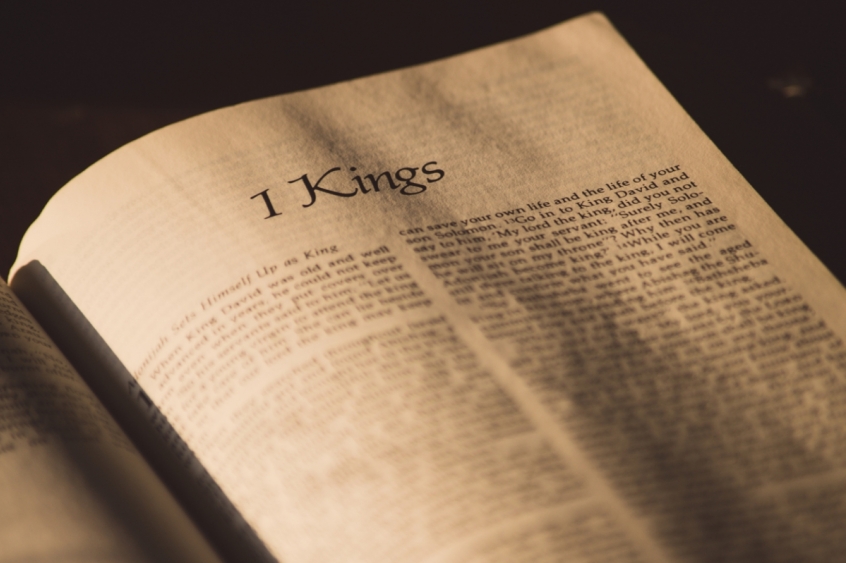
The answer, of course, is anointing with oil. In Hebrew the word mashiach meant "the anointed one," a person chosen by God. This word gives us the modern term: messiah. In Jewish history, kings and high priests had sacred olive oil poured on their heads. In this way they were anointed and identified as chosen by God.
It was believed that when a person was anointed, they received from God the wisdom and ability to do the things expected of them. This became particularly associated with the power and responsibility of being a king.
The first three kings of Israel – Saul, David, and Solomon – are all described as being anointed by a prophet. Even the Persian king Cyrus was described as a mashiach: "This is what the Lord says to his anointed, to Cyrus" (Isaiah 45:1 NRSVA). He was the only non-Jew in the Old Testament to be described as the 'Lord's anointed.'
Over time, though, the word took on a deeper meaning. It began to be used to describe a future messiah-king who would appear at the end of time, restore Israel, and bring in a new era of peace and justice. The Greek-speaking members of the early Church translated this meaning into Greek, which was christos and from this we get: "Christ," the supreme chosen one, the King of all kings, ruler of all.
However, the original root of the word lay in an act which was closely associated with human kingship and with marking out those that God had chosen for this role.
In this context we read that:
"The Lord said to Samuel... 'I will send you to Jesse the Bethlehemite, for I have
provided for myself a king among his sons.'"
(1 Samuel 16:1)
Famously, Samuel then goes on to select the person chosen by God to replace Saul as king:
"Then Samuel took the horn of oil, and anointed him [David] in the presence of his
brothers; and the spirit of the Lord came mightily upon David from that day forward."
(1 Samuel 16:13a)
The example which resonates most clearly with the British coronation service is related to David's son, Solomon:
"King David said... 'let the priest Zadok and the prophet Nathan anoint him [Solomon]
king over Israel; then blow the trumpet, and say, "Long live King Solomon!" You shall
go up following him. Let him enter and sit on my throne; he shall be king in my place;
for I have appointed him to be ruler over Israel and over Judah.'"
(1 Kings 1:32–35)
In the British coronation service, the anthem "Zadok the Priest and Nathan the Prophet" has been sung since the coronation of Edgar, at Bath in 973, and Handel's setting has been used for this since 1727. Only then follows the investing with the glittering regalia, the crowning, the enthronement, and the homage.
In 2023, the chrism oil (from olives harvested from two groves on the Mount of Olives) was consecrated in Jerusalem at The Church of the Holy Sepulchre by the Patriarch of Jerusalem and the Anglican Archbishop in Jerusalem. The oil is perfumed with essential oils – sesame, rose, jasmine, cinnamon, neroli, benzoin, amber – and orange blossom. It connects the coronation with the Biblical tradition and the Holy Land. The archbishop dips two fingers into the holy oil and anoints the king on his hands, breast, and head.
What makes a king a king?
In Anglo-Saxon England any direct descendant of a previous king was regarded as throne-worthy, an ætheling ("member of the royal family"). As the historian of Anglo-Saxon England, Kenneth Harrison, once memorably put it, at the death of a king "the hungry æthelings began to prowl".
To try to stop civil war and provide for a tidy succession, some kings attempted to designate their successors in their own lifetime. In the eighth century, Offa of Mercia did so with his son. In the ninth century, Alfred the Great was his father's fifth son and unlikely to rule. But then the early deaths of all his brothers opened the way to the throne.
The Anglo-Saxon Chronicle (probably compiled at Alfred's court), and then Alfred's contemporary biographer, both looked back at his childhood and claimed that, as a little boy, he had been sent to Rome where Pope Leo IV, "anointed him as king." This is highly unlikely and probably over-egged what had occurred there.
In the twelfth century, Stephen attempted to have his son, Eustace, crowned in 1143 but was unable to secure papal support for the project. Then, Henry II had his son (Henry "the Young King") crowned at Westminster Abbey in 1170. As it so happened, he died before his father.
This all mattered because an anointed and crowned king was, in theory, placed in such a sacred position that their right to rule should not be challenged.
The first recorded English example of an anointing at the coronation of a king who went on to rule, is that of Edgar at Bath in 973. He had become king of England in 959 but was not crowned until fourteen years later. At that point he was thirty years old, the age when Jesus started his ministry.
Edgar's anointing was clearly meant to signal the start of a new, divinely empowered, stage in his kingship. It is highly significant that the day chosen was Pentecost – the Feast of the Holy Spirit.
As with so much of Edgar's coronation, it set the scene for centuries to come. The act of anointing put God's seal on the ruler. This was crucial, although most kings did not wait as long as Edgar did. However, there was always a time gap between succeeding as king and a coronation. They were already king – but they needed and wanted more. The "more" was the unassailable right to rule that was embodied in anointing.
As Shakespeare succinctly put it:
"Not all the water in the rough rude sea
Can wash the balm off from an anointed king;
The breath of worldly men cannot depose
The deputy elected by the Lord."
(Richard II, Act 3, Scene 2, 54–57)
But then again...
Students of history and of Shakespeare are probably thinking: but wasn't Richard II deposed and murdered? What happened to the unassailable right to rule conferred by being 'the Lord's Anointed'?
The reality is that, despite being anointed, kings were deposed when they were perceived as ruling so badly that they had lost the confidence of the key political players. In these cases, the legal fiction was used that they had resigned (abdicated) the throne; an event usually followed by their murder out of sight.
Examples are Edward II (deposed 1327) and Richard II (deposed 1399). Edward IV never got around to concocting a voluntary abdication for Henry VI, who (according to one contemporary source), "died of melancholia" in 1471, while imprisoned.
Those responsible for such depositions often seemed concerned with proving their own legitimacy. Henry Bolingbroke, who deposed Richard II, was crowned King Henry IV; but whereas most anointings are carried out under a canopy to shield the sacred act, he chose to remain visible during the anointing, to emphasise his legitimacy as king.
Henry VII moved swiftly to a coronation following his defeat of Richard III at the Battle of Bosworth in 1485, and took care not to call parliament until afterwards. By then he – who had killed 'the Lord's Anointed' – had himself become the anointed king.
Even in such questionable circumstances, anointing mattered. When, in 1649, parliament tried and executed Charles I, the novel legal fiction was used that he had committed "treason" – in effect against the office of king and the people of England. There seemed no other way of holding an anointed king to account.
Since then, things have changed. The constitution has evolved. Monarchs now rule within the boundary of law and constitutional precedent. The reality is that political power is exercised by His Majesty's government, which is dependent on parliamentary legislative support, which itself is elected by universal adult suffrage.
Nevertheless, what marks out the person of the head of state is a tradition that stretches back to at least the tenth century. And that is embodied, not in crowns and ermine, but in the anointing with oil in the tradition of Samuel, and Zadok the Priest and Nathan the Prophet.
Martyn Whittock is a historian, columnist, and lay minister in the Church of England. Having written books on a wide range of historical and theological themes, he has a particular interest in the impact of the past on the present, and the interaction of faith and culture/politics. His recent books include: Jesus the Unauthorized Biography, The Story of the Cross, and The End Times, Again? He has appeared on news and talk shows, on television and radio, discussing historical themes, faith and the crown in the UK, US politics, and the war in Ukraine (including its religious dimension).













